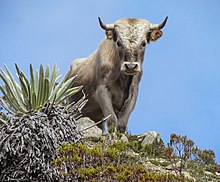Charolais
Charolais ( French breed charolaise ) is a French breed of cattle . It is mainly used for meat production and especially for crossing with other breeds. The breed takes its name from the area around Charolles , the Charolais .
Appearance
Charolais cattle are plain white to cream-colored, without pigment spots. The muzzle , horn and claws are bright.
Growth, size and weight
The growth is large, the frame is wide, deep and long; the musculature is strong; the animals are late-ripe and have a low tendency to produce fat.
| Mass and weight: | Cows | cops | Cows | cops | |
|---|---|---|---|---|---|
| Live weight | 735 kg | 1140 kg | Chest depth | 73 cm | 83 cm |
| Height at withers | 132 cm | 142 cm | Hip width | 58 cm | 62 cm |
| Hull length | 165 cm | 180 cm | Pool length | 55 cm | 57 cm |
| Chest circumference | 203 cm | 244 cm | Daily Increases | - | 1400 g |
The height at the withers of cows can reach 140 cm, that of bulls 150 cm.
Cows weigh 700–900 kg, bulls 1100–1300 kg.
Fattening and slaughter performance
The daily gain is 1350–1400 g, the feed conversion is less than 3000 starch units per kg gain. The cannibalization , i.e. the ratio of the cannibalized weight to the weight of the living animal, is good.
Origin, history and crossbreeds
The origin of the breed is disputed.
The offering of white cattle is documented as early as Roman times , breeding has been in France since the 14th century and the breed has been proven to be regionally specific cattle of the Nièvre department after the revolution . As a meat and working breed, it has been bred since the 18th century at the latest. Shorthorn cattle were crossbred in the 19th century . The first herdbook was founded in 1864. Since the 20th century, the breed has only been bred as a pure meat breed.
In South America , Charolais cattle were crossed with zebus to make Canchim cattle .


